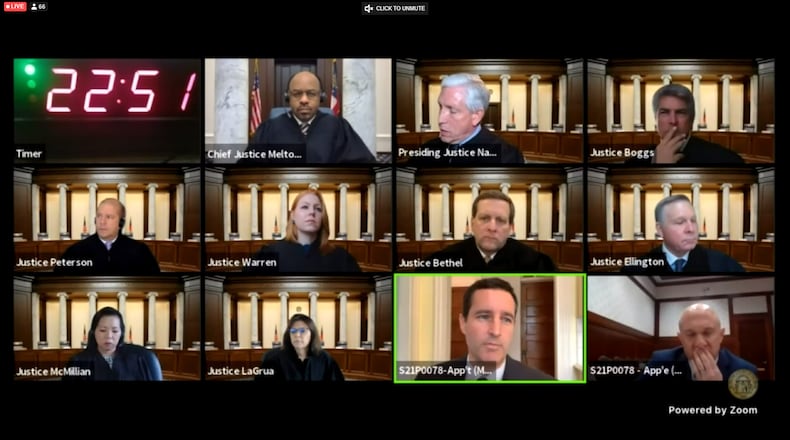Georgia’s Supreme Court justices on Tuesday grappled with an unsettling quandary: What to do with the state law banning the execution of intellectually disabled prisoners when the law’s onerous burden of proof almost certainly allows it to happen.
During oral arguments, a lawyer representing death row inmate Rodney Young asked the court to strike down that proof hurdle as unconstitutional.
“This court has before it a clear showing that it is not merely an unacceptable risk created by this standard of proof but a near certainty that persons with intellectual disability will be executed,” said Josh Moore of the state capital defender’s office.
Newton County District Attorney Randy McGinley disagreed. “There are other procedural safeguards that reduce any sort of idea there is an excessive risk,” he said, although he struggled to give examples at the justices’ urging.
At issue is the law’s requirement that capital defendants prove they are intellectually disabled beyond a reasonable doubt, the same high hurdle for proving guilt at trial. Georgia is the only death-penalty state in the country with such a burden of proof. Most others allow defendants to prove intellectual disability by a preponderance of the evidence — or that it’s more likely than not they are.
Young sits on death row for the March 30, 2008, murder of Gary Lamar Jones. Wielding a hammer and a kitchen knife, Young killed the former amateur boxer and corrections officer in Jones’ Covington home.
Lawyers for Young, who was classified as “educable mentally retarded” at school, tried but failed to convince the jury he was intellectually disabled at trial in 2012.
In 2002, the U.S. Supreme Court held it was unconstitutional to execute the mentally retarded nationwide. Nine years later, the Georgia Supreme Court upheld a challenge to the state’s law — and its beyond a reasonable doubt standard — in the capital case against Alfonso Stripling.
But on Tuesday some justices acknowledged that more recent U.S. Supreme Court opinions striking down intellectual disability standards in Texas and Florida require them to look at Georgia’s law in a different light.
Justice Nels Peterson said that while the U.S. Supreme Court’s decisions did not address a burden of proof, such as beyond a reasonable doubt, “they certainly undermined the analytical heft” of the Georgia court’s decision in Stripling’s case.
“They both say that they are meant to address the creation of an unacceptable risk that persons with intellectual disability will be executed,” Justice Charles Bethel said.
Bethel asked McGinley if there is a risk that ordinary people would believe a defendant is “probably,” “likely” or “most likely” intellectually disabled, while not believing it beyond a reasonable doubt?
“There’s always going to be a risk whatever the burden is,” the DA replied.
That’s not acceptable, Moore argued.
“The bottom line here … is that if the framework creates an unacceptable risk that persons with intellectual disability will be executed, it is unconstitutional,” Moore said. “That’s exactly what we’re dealing with.”
About the Author
The Latest
Featured




